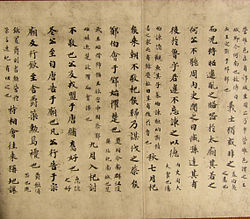- Spring and Autumn Annals
-
Spring and Autumn Annals Chinese 春 秋 Transcriptions Mandarin - Hanyu Pinyin Chūnqiū Min - Hokkien POJ chhun chhiu Cantonese (Yue) - Jyutping cyun1 cau1 Alternative Chinese name Traditional Chinese 麟 經 Simplified Chinese 麟 经 Transcriptions Mandarin - Hanyu Pinyin Línjīng Min - Hokkien POJ Lîn ging Cantonese (Yue) - Jyutping Leon4 ging1 The Spring and Autumn Annals is the official chronicle of the State of Lu covering the period from 722 BCE to 481 BCE. It is the earliest surviving Chinese historical text to be arranged on annalistic principles. The text is extremely concise and, if all the commentaries are excluded, about 16,000 words long. Because of this its meaning can only be appreciated with the aid of ancient commentaries, especially the traditional Commentary of Zuo.
Because it was traditionally regarded as having been compiled by Confucius (after a claim to this effect by Mencius), it was included as one of the Five Classics of Chinese literature. However, few modern scholars believe that Confucius had much influence on the formation of the text; this is now assigned to various chroniclers from the State of Lu.
Contents
Content and organization
In early China, "spring and autumn" was a commonly used metonymy for the year as a whole, and the phrase was used as a title for the chronicles of several Chinese states during this period. For example, the chapter of Obvious Existence of Ghosts in the Mozi refers to numerous Spring and Autumn Annals of Zhou, Yan, Song and Qi. All these texts are now lost; only the chronicle of the State of Lu has survived.
The scope of events recorded in the book is quite limited. The focus is on various feudal states' diplomatic relations, alliances and military actions, as well as births and deaths among the ruling families. The chronicle also takes note of natural disasters such as floods, earthquakes, locusts and solar eclipses, since these were seen as reflecting the influence of heaven on the world of humans.
Events are narrated in chronological order, dated by the reign-year of the Duke of Lu, the season, the month and the day according to the Chinese sexagenary cycle. The annalist structure is followed strictly, to the extent of listing the four seasons of each year even when no events are recorded.
The style is terse and impersonal, and gives no clue as to the actual authorship.
Commentaries
Since the text of this book is terse and its contents limited, a number of commentaries were composed to explain and expand on its meanings. The Book of Han vol. 30 lists five commentaries:
- The Commentary of Zou (鄒氏傳)
- The Commentary of Jia (夾氏傳)
- The Commentary of Gongyang (公羊傳)
- The Commentary of Guliang (榖梁傳)
- The Commentary of Zuo (左氏傳) (also known as 左氏春秋)
No text of the Zou or Jia commentaries has survived. The Gongyang and Guliang commentaries were compiled during the 2nd century BCE, although modern scholars had suggested they probably incorporate earlier written and oral traditions of explanation from the period of Warring States. They are based upon different editions of the Spring and Autumn Annals, and are phrased as questions and answers. The surviving commentaries are known collectively as the Three Commentaries on the Spring and Autumn Annals.
The Commentary of Zuo, also known as the Zuo Zhuan, composed in the early 4th century BCE, is a general history covering the period from 722 to 468 BCE which follows the succession of the rulers of the State of Lu. Modern scholars disagree about whether it is truly a commentary on the Spring and Autumn Annals or an independent work. In any case, scholars have found it by far the most useful among the three surviving 'commentaries' both as a historical source for the period and as a guide to interpreting the Annals.
See also
References
- Cheng, Anne (1993). "Ch'un ch'iu 春秋, Kung yang 公羊, Ku liang 榖梁 and Tso chuan 左傳", pp. 67–76 in Loewe, Michael (ed.) "Early Chinese Texts: A Bibliographical Guide", (Early China Special Monograph Series No. 2), Society for the Study of Early China, and the Institute of East Asian Studies, University of California, Berkeley, ISBN 1-55729-043-1
External links
- Full text of Spring and Autumn Annals (Chinese)
- Chinese Literature - Spring and Autumn Annals Chinaknowledge.de
Confucian Texts The Four Books The Five Classics Classic of Poetry • Classic of History • Classic of Rites • Classic of Changes • Spring and Autumn AnnalsThe Three Commentaries The Thirteen Classics Classic of Poetry • Classic of History • Rites of Zhou • The Ceremonies and Rites • Classic of Rites • Classic of Changes • The Commentary of Zuo • The Commentary of Gongyang • The Commentary of Guliang • The Analects • Luxuriant and Refined Words • The Classic of Filial Piety • The MenciusOther Categories:- Chinese history texts
- Chinese classic texts
- Confucian texts
- 5th-century BC history books
- Chronicles
Wikimedia Foundation. 2010.


